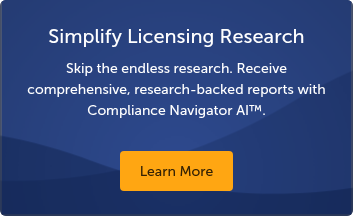
Home Health Agency License
The United States healthcare industry is carefully regulated. If you wish to start or expand a home health agency, you need to ensure you abide by state and federal regulations.
What Is a Home Health Agency?
Home health agencies provide care services to ill, disabled, or vulnerable individuals in their homes or places of residence to help clients live as independently as possible. All home health agencies are required to provide care within the minimum health and safety standards established by state and federal rules and regulations.
Home health agencies are primarily engaged in providing skilled nursing services and other therapeutic services. They may be public, nonprofit, or proprietary organizations. Typical duties include the following:
- Providing supervision of services as assigned by a physician or registered professional nurse
- Maintaining clinical records
- Managing an overall plan and budget for institutional planning
- Meeting federal requirements that protect the health and safety of individuals who receive home health agency services
- Planning to meet additional requirements as they are put in effect
Note that home health agencies do not provide primary care or treatment for mental diseases per Title XVIII of the Social Security Act. To ensure home health agencies are abiding by all rules and regulations, states often conduct initial federal certification surveys and periodic, unannounced surveys in addition to state licensure surveys.
How to Start a Licensed Home Health Agency
The process for meeting the home health care agency licensing requirements varies by state. However, there are some steps that you should take no matter where you plan to start or expand your practice. Your should do the following:
- Learn your state’s home health agency regulations
- Learn about expected fees and costs
- Determine if you need to acquire a Certificate of Need
- Choose an office location
- Work on a business plan that includes a financial plan
- Register your business with the secretary of state
When registering the business, most home health agencies register as limited liability companies (LLCs) or corporations. The entity structure you choose will depend on your business goals and needs. You will also need to appoint a registered agent to receive lawsuit notices and other legal or government notices. Then, you can register your business through your state’s licensing authority.
Steps to Get a Home Health Agency License
Most states require a home health care license to operate non-medical services and skilled nursing services. The application process varies from state to state. In many states, you will need to decide if you will offer non-medical home health services like personal care and housekeeping, or open a home health agency that provides skilled care. The licensing process can take a little as three months or as long as 12 to 18 months. The primary factor affecting applications is states’ processing wait times.
While licensing is not guaranteed, a complete application that includes all of the requested documents will increase your chances of being approved the first time. However, if you forget to include something in the application, you will be notified, and you will have to provide additional information. This can significantly delay the process of your application.
Depending on your state’s application process, you can expect an on-site inspection before or after licensure. The inspector will verify that your facilities meet state and federal requirements and that your business abides by state-specific policies, procedures, and protocols.
Maintaining and Renewing a Home Health Agency License
You will need to ensure you maintain the license’s status. State requirements vary, but renewals are often required on an annual basis. You may need to submit a renewal application, pay a renewal fee, or pursue continuing education. Complying with renewal requirements will ensure you can continue to operate your business without disruption.
Keeping on track with your business’s license renewals can be complicated, especially as a growing company. At Harbor Compliance, our managed annual reporting and registered agent services ensure accurate due date tracking and on-time filing. This way, your business will continue to be compliant with state and local requirements, and you will have the time you need to continue working and expanding your clientele.
If you are currently operating a home health agency and are looking to outsource your maintenance and renewal duties, Harbor Compliance can help. We are available to review your business status, ensure you are in good standing in the state you operate, and explain what steps you need to take in order to ensure you remain compliant with state and federal regulations.
Explore Licensing by State
Click on a link below to view licensing information in your state.
Meeting the home health agency licensing requirements is not always an easy process. Fortunately, Harbor Compliance’s License Manager helps healthcare professionals maintain their licenses by automating repetitive tasks such as tracking renewals and compliance deadlines. Through License Manager, you can also access Compliance Core™ – our extensive, proprietary database of nationwide licensing requirements – to research the requirements for the states in which you work. Contact our licensing experts today to learn more.
Controlled Substance Registration - In addition to a pharmacy license, controlled substance registration registration is required in many states for pharmacies that distribute controlled substances.
NABP (National Association of Boards of Pharmacy) - Host a variety of programs and resources relating to pharmacist and pharmacy licensure and examination.
Pharmacist in Charge - A licensed pharmacist designated by a pharmacy to act as the party responsible for compliance with regulations.
VPP (Verified Pharmacy Program) - A program run by NABP that allows state boards to share information and more easily register out-of-state pharmacies.



